BMW iX3 vs Ford Explorer EV - Differences and prices compared
Costs and Efficiency:
Price and efficiency are often the first things buyers look at. Here it becomes clear which model has the long-term edge – whether at the pump, the plug, or in purchase price.
Ford Explorer EV has a clearly advantage in terms of price – it starts at 34200 £, while the BMW iX3 costs 59100 £. That’s a price difference of around 24857 £.
In terms of energy consumption, the advantage goes to the Ford Explorer EV: with 14.50 kWh per 100 km, it’s barely noticeable more efficient than the BMW iX3 with 15.10 kWh. That’s a difference of about 0.60 kWh.
As for range, the BMW iX3 performs evident better – achieving up to 805 km, about 203 km more than the Ford Explorer EV.
Engine and Performance:
Under the bonnet, it becomes clear which model is tuned for sportiness and which one takes the lead when you hit the accelerator.
When it comes to engine power, the BMW iX3 has a clearly perceptible edge – offering 469 HP compared to 340 HP. That’s roughly 129 HP more horsepower.
In acceleration from 0 to 100 km/h, the BMW iX3 is slight quicker – completing the sprint in 4.90 s, while the Ford Explorer EV takes 5.30 s. That’s about 0.40 s faster.
In terms of top speed, the BMW iX3 performs somewhat better – reaching 210 km/h, while the Ford Explorer EV tops out at 180 km/h. The difference is around 30 km/h.
There’s also a difference in torque: Ford Explorer EV pulls barely noticeable stronger with 679 Nm compared to 645 Nm. That’s about 34 Nm difference.
Space and Everyday Use:
Whether family car or daily driver – which one offers more room, flexibility and comfort?
Seats: offers more seating capacity – vs .
In curb weight, Ford Explorer EV is distinct lighter – 1908 kg compared to 2360 kg. The difference is around 452 kg.
In terms of boot space, the BMW iX3 offers to a small extent more room – 520 L compared to 450 L. That’s a difference of about 70 L.
In maximum load capacity, the BMW iX3 performs somewhat better – up to 1750 L, which is about 328 L more than the Ford Explorer EV.
When it comes to payload, Ford Explorer EV evident takes the win – 585 kg compared to 465 kg. That’s a difference of about 120 kg.
Who wins the race?
The BMW iX3 proves to be edges ahead and therefore becomes our DriveDuel Champion!
BMW iX3 is the better all-rounder in this comparison.
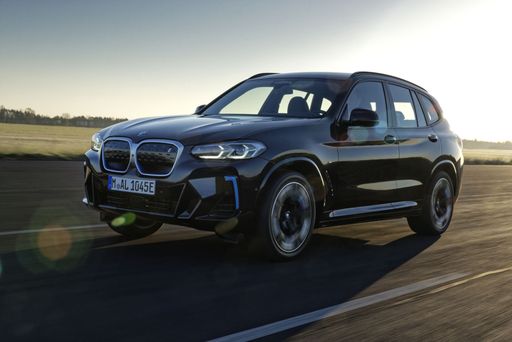 @ BMW Group Press
@ BMW Group Press
BMW iX3
Costs and Consumption
View detailed analysis
Engine and Performance
View detailed analysis
Dimensions and Body
View detailed analysis
BMW iX3
The BMW iX3 brings BMW's familiar SUV poise into the electric era, blending restrained styling and a comfortable, composed ride that will please traditionalists dipping their toes into electrification. It's quiet, practical and rather grown-up about going electric — a sensible choice for buyers who want BMW driving manners without the drama.
details @ BMW Group Press
@ BMW Group Press
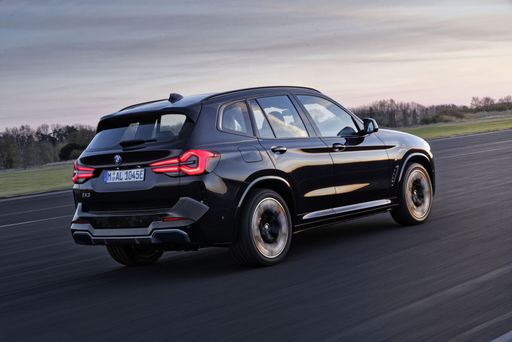 @ BMW Group Press
@ BMW Group Press
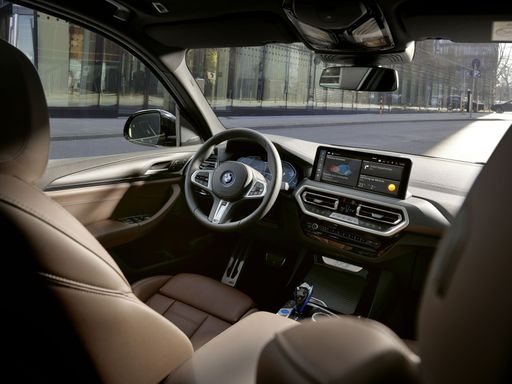 @ BMW Group Press
@ BMW Group Press
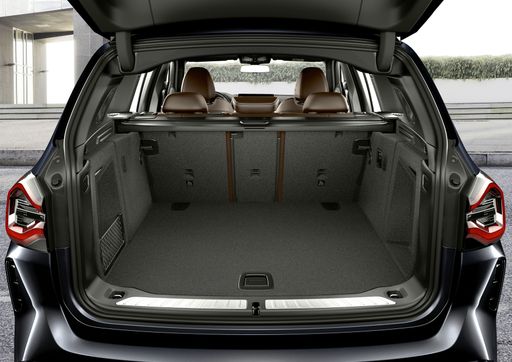 @ BMW Group Press
@ BMW Group Press
Ford Explorer EV
The Ford Explorer EV translates the familiar big‑American SUV presence into whisper‑quiet electric motoring, offering roomy seating and a tech‑forward cabin that will please families and road‑trippers alike. It drives with more composure than its boxy looks suggest, blending a comfortable ride and eager acceleration while undercutting the guilt of gas stops — a practical, modern alternative for buyers who want Explorer space with electric charm.
details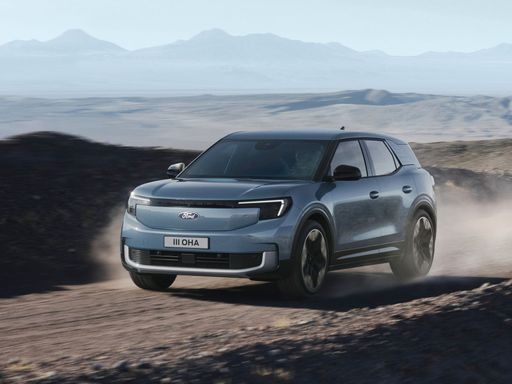 @ Ford Motor Company / Ford Media Center
@ Ford Motor Company / Ford Media Center
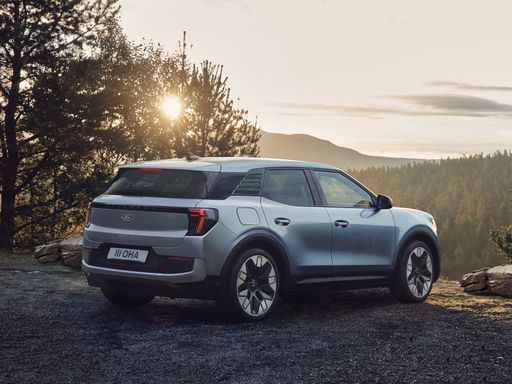 @ Ford Motor Company / Ford Media Center
@ Ford Motor Company / Ford Media Center
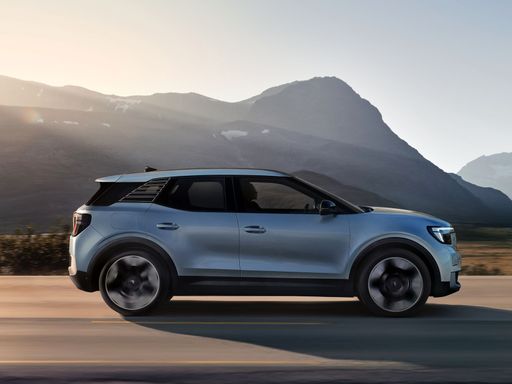 @ Ford Motor Company / Ford Media Center
@ Ford Motor Company / Ford Media Center
 @ BMW Group Press
@ BMW Group Press
|
 @ Ford Motor Company / Ford Media Center
@ Ford Motor Company / Ford Media Center
|
|
|
|
Costs and Consumption |
|
|---|---|
|
Price
59100 - 64600 £
|
Price
34200 - 48800 £
|
|
Consumption L/100km
-
|
Consumption L/100km
-
|
|
Consumption kWh/100km
15.10 kWh
|
Consumption kWh/100km
14.5 - 17.2 kWh
|
|
Electric Range
805 km
|
Electric Range
360 - 602 km
|
|
Battery Capacity
108.70 kWh
|
Battery Capacity
52 - 79 kWh
|
|
co2
0 g/km
|
co2
0 g/km
|
|
Fuel tank capacity
-
|
Fuel tank capacity
-
|
Dimensions and Body |
|
|---|---|
|
Body Type
SUV
|
Body Type
SUV
|
|
Seats
5
|
Seats
5
|
|
Doors
5
|
Doors
5
|
|
Curb weight
2360 kg
|
Curb weight
1908 - 2179 kg
|
|
Trunk capacity
520 L
|
Trunk capacity
445 - 450 L
|
|
Length
4782 mm
|
Length
4468 mm
|
|
Width
1895 mm
|
Width
1871 mm
|
|
Height
1635 mm
|
Height
1630 - 1639 mm
|
|
Max trunk capacity
1750 L
|
Max trunk capacity
1417 - 1422 L
|
|
Payload
465 kg
|
Payload
561 - 585 kg
|
Engine and Performance |
|
|---|---|
|
Engine Type
Electric
|
Engine Type
Electric
|
|
Transmission
Automatic
|
Transmission
Automatic
|
|
Transmission Detail
Reduction Gearbox
|
Transmission Detail
Reduction Gearbox
|
|
Drive Type
All-Wheel Drive
|
Drive Type
Rear-Wheel Drive, All-Wheel Drive
|
|
Power HP
469 HP
|
Power HP
170 - 340 HP
|
|
Acceleration 0-100km/h
4.90 s
|
Acceleration 0-100km/h
5.3 - 8.7 s
|
|
Max Speed
210 km/h
|
Max Speed
160 - 180 km/h
|
|
Torque
645 Nm
|
Torque
310 - 679 Nm
|
|
Number of Cylinders
-
|
Number of Cylinders
-
|
|
Power kW
345 kW
|
Power kW
125 - 250 kW
|
|
Engine capacity
-
|
Engine capacity
-
|
General |
|
|---|---|
|
Model Year
2026
|
Model Year
2024 - 2025
|
|
CO2 Efficiency Class
A
|
CO2 Efficiency Class
A
|
|
Brand
BMW
|
Brand
Ford
|
What drive types are available for the BMW iX3?
The BMW iX3 is available as All-Wheel Drive.
The prices and data displayed are estimates based on German list prices and may vary by country. This information is not legally binding.
